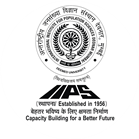- About IIPS
- Academics
- Study @ IIPS
- Departments
- Centres
- Controller of Examination
- Programme
- Distance and Online Education
- Training
- Facilities/Services
- Resources
- Virtual Learning
- Digital Initiatives (MHRD)
- Notice
- Seminars / Workshops / Conferences
- Conferences
- Publications
- Seminars
- Sponsored Research
- Workshops
- Collaboration
- National
- International
- NEP 2020
- Admission
- Courses
- Admission Bulletin
- TIME-TABLE For Admission 2025-26
- Model Question Papers
- Programme Coordinators
- Fellowships
- Academic Calendar
- International Students
- Visa Information
- Administration
- Faculty & Staff
- Research & Publications
- Library
- Information
- Right to Information
- Vigilance Officer
- Annual Report
- Director's Report
- Cells & Commitees
- Cells
- Commitees
- Committees of NEP 2020
- Staff Walfare Committee
- Cultural Committee
- Internal Committee
- Purchase Commitee
- Students Academic Committee
- Student Research Ethics Committee
- Anti-Ragging Committee
- Institutional Review Board
- Social Media Committee
- Prevention of Caste-based Discrimination Committee
- Code of Conduct and Professional Ethics
- National and International honours, Awards, Recognition, and Medals
- Online Facilities
- Employee's Corner
- Memorial Lectures
- Convocation
- IIPS Newsletters
- COVID 19 Information
- Life @ IIPS
Implications of migration on health and education: returned migrants and school teachers perspective in India: A qualitative study
- Home
- Implications of migration on health and education: returned migrants and school teachers perspective in India: A qualitative study
Abstract Content (not more than 300 word, should include: Introduction, Objective, Methodology, critical findings & Conclusion):
Background: Poor tribal communities migrate from rural to urban areas to tackle their financial hardships. However, limited empirical literature collectively delves into the implications of health and educational attainments of household members of migrant households, while examining the intricate dynamics of labour migration among tribal Indian communities in India.
Objective: This study aims to examine the effects of labour migration on household health and education for accompanied and left-behind children.
Methods: Twenty-two semi-structured interviews and two focus group discussions (6–8 participants) were conducted in four tribal communities in India from August to November 2022 with recent 14 recent returned migrants, three left behind adolescents of school age, three
teachers and two Panchayat heads (community head). Data were analysed through an inductive thematic approach.
Results: Participants identified a lack of adequate housing and sanitation conditions, with intense and long labour hours as conditions at migration destinations that affect their health. Lack of maternal and child healthcare is
staggering at the place of work. In particular, our findings revealed that temporary labour migrants do not enrol their children in schools; however, the case was different from permanent and long-term migrants who enrol their children in private schools. At their place of origin, school teachers reported frequent school dropouts, low enrolment, attendance and poor academic achievements among children of migrating households. There is prominent gender dynamics in academic performances, and its determinants. Early age marriage and joining labour force dropping-out of school is common.
Conclusion: The results highlight the negative effects of migration as a livelihood strategy on rural communities, particularly in the health and education of household members, asking for immediate government interventions.
Abstract theme:
In case of not been selected for oral presentation, do you want to be considered for the poster presentation ?:
Yes
Do you require financial support to attend the seminar ? (Not applicable for virtual meet):
Yes-full
Gender:
Male
Evaluation Status:
No
